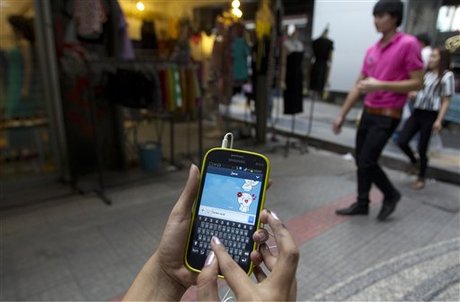Thai Police Seek to Monitor Chat App for Crimes

Thai police asked the operator of the popular "Line" instant messaging app for access to records of online chats, raising concerns about intrusive surveillance despite promising only suspected criminals would be targeted.
Technology Crime Suppression division chief Pisit Paoin said Tuesday that police want to review the data of users they suspect are involved in crimes, including making statements against the Thai monarchy, arms trading, prostitution and drug dealing.
Thailand has draconian lese majeste laws, which impose maximum prison terms of 15 years for insulting the monarch, and government officials attempt to scrub the Internet of statements critical of the king and his family.
"We are monitoring only those who break the law. If you're using Line and social media to break the law, then you see us, the police," Pisit told The Associated Press.
Prime Minister Yingluck Shinawatra said the government did not intend to limit people's freedom and any monitoring would target individuals rather than the general public.
But the police move has raised concerns about violations of privacy and free speech.
"Line messaging is one way of interpersonal communication," said Pirongrong Ramasoota, a Communication Arts professor at Chulalongkorn University in Bangkok. "Whatever you say, type or chat is part of your freedom of expression and it should not be taken away from you."
She called on the police to seek a court warrant in cases where they want to access the private data of individuals.
"Thailand is one of very few countries in the world that does not have data protection law," she said. "Authorities, therefore, should use extra caution when it comes to citizen surveillance."
Pisit said his unit approached Line operator Naver in South Korea, and in Japan where its servers are based, and was hopeful of cooperation. He expects to meet with Line representatives in Tokyo on Friday.
He said requests for information would be on a case-by-case basis.
Line said it is committed to protecting the privacy of its users and had not received an official request from the Thai police.
"Line does not collect or store any information from its users as we protect user's privacy and maintain a global-level of security standards," it said in an e-mailed statement.
Line, which was launched in June 2011, has more than 200 million registered users around the world. More than 10 million of them are in Thailand.
Last week, technology police summoned four people for posting coup rumors on Facebook and threatened to charge anyone who "liked" the postings.
Pisit has since downplayed his threats to press charges but said he would not encourage users to "like" the posts because it could increase the legitimacy of any false statements.
Thai Netizen Network, an Internet freedom advocacy group, urged police and the government to refrain from creating fear among Internet users.



